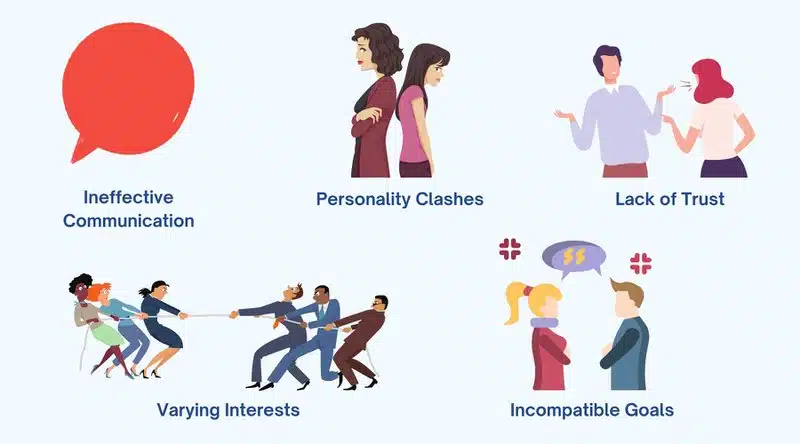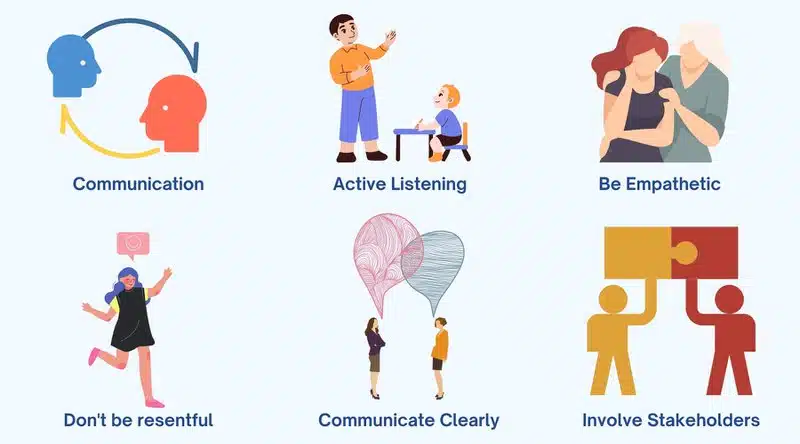Conflicts are old as the human race. Any situation that involves two or more people has the potential to become a conflict. The earliest conflicts have occurred over territory, food, and other scarce resources. In this piece, we shall focus on interpersonal conflicts and how to solve them.
Conflicts: Definition and Types

Firstly, let us look at the definition of a conflict.
Simply put, a conflict is a serious disagreement. It arises when individuals have different interests, values, opinions, and they cannot find a middle ground.
Further, there exist several types of conflict that happen between people. These are:
- Intrapersonal
- Interpersonal
- Intragroup
- Intergroup
Let us explore each of these conflicts in a little more detail.
Intrapersonal Conflicts
A single individual experiences this kind of conflict. People experience intrapersonal conflicts on a daily basis when their values, goals, or roles diverge. However, the simple act of prioritization resolves these conflicts.
Some examples of this type of conflict are choices such as –
- watching television or studying for an exam.
- Pursuing an MBA or a job posting abroad
- Dinner with family or dinner with the client
Interpersonal Conflicts
This situation occurs when individuals tend to differ on the end goal and the approach, amongst other things. Interpersonal conflicts can escalate quickly, and things can become personal if not resolved in the nick of time.
Intragroup Conflicts
These conflicts take place in the same teams while working on a common end goal. Intragroup conflicts are a result of different approaches and mindsets. Intragroup conflicts can be considered healthy to a certain extent as they prevent the phenomenon of groupthink.
An example of an intragroup conflict is disagreement on the timing of a product launch.
Intergroup Conflicts
Intergroup conflicts, as the name suggests, are conflicts between different groups. These groups can be within an organization or outside of it. These occur when the teams in question do not have the same overarching goals. It becomes the responsibility of the organization to ensure that these conflicts do not get out of hand.
The whole firm must work towards the overall progress of the firm in a seamless manner.
Why Do Interpersonal Conflicts Happen?

Every person eventually runs into interpersonal conflicts at some point in their life. Furthermore, these conflicts are not limited to the workplace. Interpersonal conflicts can happen between friends as well. Here are some reasons that cause these conflicts.
Ineffective Communication
A significant reason that these conflicts happen is due to poor communication. For instance, a lack of clarity about outcomes, timelines, and deliverables in a project often leads to interpersonal conflicts at the workplace. This is a classic case that can be avoided by communicating clearly with all the stakeholders. Employees must be proactive in minimizing such situations.
Personality Clashes
Every individual has a different personality that he brings to the workplace. Some people are reserved and tend to be serious individuals, which is in sharp contrast to people who are more energetic, loud, and cheerful.
Since these personalities are at opposite ends of the spectrum, there is a greater likelihood of conflict. More extroverted people are viewed as taking their work lightly, and such assumptions increase the chances of interpersonal conflicts.
Lack of Trust
Trust issues amongst colleagues could lead to interpersonal conflicts. When colleagues are wary of each other, the office environment becomes toxic, and the team lacks cohesion.
Varying Interests
Interpersonal conflicts are more common when people having different interests work together. They find it challenging to compromise and reach a solution acceptable to all members.
Incompatible Goals
A person’s goals must be in sync with the overall objectives of the team or the organization. People with common goals understand their roles and responsibilities better, and hence they work better as a unit.
Now that we have a basic understanding of why interpersonal conflicts occur. Let us examine their types.
Types of Interpersonal Conflicts

There are many different kinds of interpersonal conflicts. So let us examine each one in a little more detail in this section.
Pseudo Conflicts
These conflicts occur when the parties involved believe that they have different end goals but, in reality, have the same end goal. Here a misunderstanding leads to a difference of opinion.
Pseudo conflicts take the form of trivial arguments that, in turn, hide the root cause of the problem. Additionally, there are also chances that pseudo conflicts result in teasing or mocking.
Pseudo conflicts are generally resolved through a simple clarification.
Fact Conflicts
This is another type of interpersonal conflict. Suppose you say that the tomato is a fruit while your friend claims it is a vegetable, and a fact conflict has occurred. As illustrated, a fact conflict occurs over a piece of information.
These conflicts can be quickly resolved. All a person needs to do is to check a verifiable source.
Policy Conflicts
This kind of interpersonal conflict occurs when the interested parties have a completely different approach to a particular situation. These different opinions or practices arise due to several factors: education, perspective, circumstances, upbringing, etc.
Policy-related conflicts are common in the workplace, and these are resolved by finding a solution that fits the given situation. However, mostly a middle ground is preferred.
Value Conflict
These occur when the individuals involved have diverse value systems. For instance, a colleague of yours might believe it’s acceptable to work beyond office hours for the firm. However, this might go entirely against your mindset. Value conflicts are one of the hardest to resolve, and it is best to acknowledge and respect the fact that everyone has different priorities in life.
Ego Conflict
In this conflict, a person puts his pride at stake. Ego conflicts happen because of small resentments that build up over time. For instance, if the manager constantly criticizes a team member and praises another, it results in an ego conflict. This kind of interpersonal conflict is also the result of linking results to intelligence.
Moreover, judgemental remarks also fuel ego conflicts, and the attention is diverted from the issue at hand in an ego conflict.
Resolution of Interpersonal Conflicts

As mentioned initially, conflicts have been a part of human evolution, and so has conflict resolution. The ability to diffuse tensions between people is a handy skill. There are various tried and tested methods to resolve conflicts. Let us look at them below:
Communication
It is essential that the parties involved in an interpersonal conflict talk to one another. Keep all channels of communication open. However, merely talking does not help. One has to understand the other person’s point of view truly. These conversations must be warm and pleasant. Both individuals have to stick to the topic at hand.
Active Listening
This is a vital part of the conflict resolution process. One has to pay attention to and process what the other person is saying. Here, a person has to observe both verbal and non-verbal cues to get the message completely. Moreover, one should not take the other stakeholder’s concerns lightly.
Be Empathetic
Being an attentive listener and placing oneself in another person’s shoes go a long way in resolving conflicts. Displaying empathy is a great way to show that you care about the other individuals involved and are a team player in the true sense of the word.
Don’t be Resentful
A significant reason why interpersonal conflicts fester and remain unsolved for a long time is resentment among colleagues. One must always make efforts to clear the air, apologize if necessary and move on. This helps a person focus on the job instead of creating a toxic environment at the workplace.
Communicate Clearly
Clear communication is the key to avoiding a lot of conflicts at the workplace. One has to be articulate in explaining why a particular task cannot be done. This is extremely helpful when a person is facing unrealistic deadlines. Some valuable pointers to improving communication are:
- assertiveness
- maintaining eye contact
- Positive body language
- Staying on topic
Involve the stakeholders
While resolving an interpersonal conflict, it is imperative to chart a solution that involves all the parties. Then both groups can begin the process of resolution. This includes the following steps- defining the conflict, deciding upon the framework of the conflict, creating alternatives, and reaching a solution.
In Conclusion
A workplace will always have interpersonal conflicts. This is because of the varying nature of job responsibilities, reaction to pressure situations, and interaction styles, to name a few of the many factors that exist.
Since every human being is unique, it only makes sense that they will have different and unique opinions on different subjects, resulting in interpersonal conflicts. But interpersonal conflicts can always be resolved.
Every interpersonal situation has a solution in which everyone wins. – Del Close.
One cannot always hope to stay away from conflicts, and thus adopting a mature approach that leads to resolution with minimal friction is the best long-term solution.

Ranu Kumari is a Professional Writer and a Marketing enthusiast who currently runs her own Marketing Consultancy, LatitudeBOX. She has written promotional articles for multiple brands and has published her work in Scopus indexed journals. She is passionate about expressing her thoughts and ideas to connect with her readers in a voice that they understand.

Interpersonal conflicts can be a difficult thing to deal with, but with a little bit of understanding and effort, they can be resolved. Here are a few tips to help you get started:
1. Talk to your partner